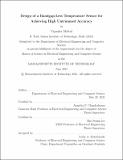Design of a Bandgap-Less Temperature Sensor for Achieving High Untrimmed Accuracy
Author(s)
Mittal, Vipasha
DownloadThesis PDF (5.782Mb)
Advisor
Chandrakasan, Anantha P.
Lee, Hae Seung
Terms of use
Metadata
Show full item recordAbstract
Temperature sensors are extensively used in measurement, instrumentation and control systems. CMOS based temperature sensors offer benefits of low cost and direct digital outputs over conventional sensors. However, they are limited in their absolute
accuracy due to the non-ideal behaviour of the devices used to design them. Therefore, these sensors require either calibration or gain, offset and linearity adjustments to achieve desired accuracies. The latter process, also called trimming needs additional expensive test equipment, valuable production time and is a major contributor to the cost of the sensors. In order to enable high volume production of CMOS based temperature sensors at low cost, it is imperative to achieve high accuracies without trimming.
This work describes the design of an untrimmed, bandgap-less CMOS temperature sensor based on fundamental physical quantities resilient to process variations, package stress and manufacturing tolerances. Compared to previous art, this sensor employs high-thermal noise switched capacitor amplifiers, which are digitized by a bandgap-less successive approximation analog-to-digital converter. The flicker noise is attenuated through autozeroing, which also allows amplifying the thermal noise further. This work demonstrates the design of the first untrimmed closed-loop thermal noise temperature sensor. The chip is fabricated in TSMC 65 nm low-power process and simulation results show that the sensor achieves an untrimmed 3𝜎 inaccuracy of
less than 1 deg C.
Date issued
2021-06Department
Massachusetts Institute of Technology. Department of Electrical Engineering and Computer SciencePublisher
Massachusetts Institute of Technology